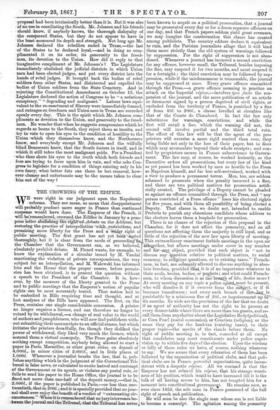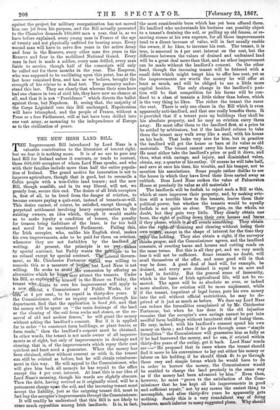*THE CROWNING OF TIM EDIFICE.
WE were right in our judgment upon the Napoleonic reforms. They are mean, so mean that disappointment will probably produce more anger in France than continued suspense would have done. The Eniperor of the French, it will be'remembered, crowned the Edifice in Janeary by a pom- pous leiter aliii1shhigliii-rigItraf.41ebate on the Address, but restoring the practice of interpellationrestrictions, and
promising more liberty for the Press and a • r right of public meeting. The first grant has not yet been sted thoroughly, but it is clear from the mode of proceeding the Chamber that the Government can, as we believed, absolutely-prohibit debate. M. Picard wants, for example, to know the explanation of a circular issued by M. Vandal sanctioning the violation of private correspondence, the very subject for an interpellation, and M. Walewski has informed him and the House that the proper course, before permis- sion has been obtained, is to present the question without a speech to the President of the Chamber. It is, how- ever, by the measure of the liberty granted to the Press and to public meetings that the Emperor's notion of popular rights can be most accurately tested. That notion had to be embodied in Bills requiring time and thought, and at last analyses of the Bills have appeared. The first, on the Press, contains one single considerable concession. A printer no longer requires a licence, and can therefore no longer be rained by its withdrawal,—a change of real value to the world of authors and pamphleteers, who will now find publishers with- out submitting their manuscripts to an official censor, but which irritates the printers dreadfully, for, though they disliked the power of withdrawal, they liked very much the licence, which secured them a virtual monopoly. The Press gains absolutely nothing except competition, anybody being allowed to start a paper in Paris, Marseilles, or other great cities, on deposit of 4,0001., in minor cities of 2,000/., and in little places of 1,000/. Whenever a journalist breaks the law, that is, pub- lishes anything which in the judgment of the Correctional Tri- bunal is false news, or calculated to excite hatred and contempt of the Government or its agents, or violates any postal rule, or fails to send his paper to the Home Office, the journal is to be fined not more than one-half of the deposit money,—that is, 2,0001., if the paper is published in Paris,—or less than one- twentieth, that is, 2001.; and it is specially provided that no jour- nal shall ever enjoy the benefit of a verdict of "extenuating cir- cumstances." When it is remembered that no juryintervenes be- tween the journal and the Tribunal, that the Tribunal has never
been known to acquit on a political prosecution, that a journal may be prosecuted every day or for a dozen separate offences on one day, and that French papers seldom yield great revenues, we may imagine the consternation this clause has created among publicists. The country editors declare it equivalent to ruin, and the Parisian journalists allege that it will bind them more strictly than the old system of warnings followed by suppression. For the right of suppression is not aban- doned. Whenever a journal has incurred a second conviction for any offence, however small, the Tribunal, besides imposing the fine, may suspend it for two months, and must suspend it for a fortnight.; the third conviction may be followed by sup- pression, while if the misdemeanour is treasonable, the journal may be suppressed at once. Every grave offence committed through the Press,—a grave offence meaning in practice an attack on the Imperial regime,—involves ipso facto the sus- pension of the journal, and the mere publication of an article or document signed by a person deprived of civil rights, or excluded from the territory of France, is punished by a fine of from 40/: to 200/., a clause levelled at circulars like that of the Comte de Chambord. In fact the law only substitutes for warnings, convictions, and while the first will entail a fine, which the warning did not, the second will involve partial and the third total ruin. The effect of this law will be that the agent of the pro- prietors will exercise a more rigid control than ever, they being liable not only to the loss of their paper, but to fines which may accumulate beyond their whole receipts ; and con- trol by proprietors means in France subservience to Govern- ment. The law may, of course, be worked leniently, as the Executive orders all prosecutions, but every law of the kind as yet passed has been worked by men as hostile to the Press as Napoleon himself, and far less self-restrained, worked with a view to produce a permanent terror. Men, too, are seldom ashamed to prosecute when the penalty incurred is a fine, and there are two political motives for prosecution artifi- cially created. The privilege of a Deputy cannot be pleaded as against an offence committed through the Press, and "any person convicted of a Press offence" loses his electoral rights for five years, and with them all possibility of being elected a Deputy. That clause is, we doubt not, intended to enable Prefects to punish any obnoxious candidate whose address to the electors leaves them a loophole for prosecution.
There is no chance of the rejection of this proposal in the Chamber, for it does not affect the peasantry, and on all questions not affecting them the majority is still loyal, and as little of the rejection of the new law upon liberty of meeting. This extraordinary enactment forbids meetings in the open air ether, but allows meetings under cover in any number
and o object, provided that such object is "not to discuss any istion relative to political matters, to social economy, to reh 441.rs questions, or to existing taxes." French- men, in fact, are sotaarely allowed to discuss anything in abso- lute freedom, provided tIrtakit is of no importance whatever to their souls, brains, bodies, or kets ; and what could French- men, to whom discussion is as the i th of life, desire more ? At every meeting on any topic a police age must be present, who will dissolve it if it swerves from the en • et, or if it
becomes tumultuous ; and every such breach of Is punishable by a minimum fine of 201., or imprisonment up to six months. So wide are the provisions of the law that we doubt if an agent of authority has not the right to be present at every dinner-table where there are more than ten guests, and re- call them from any chatter about the Legislative Body (political), or Cora Pearl (social economics), or Comtism (religion), or the sums they pay for the land-tax (existing taxes), to their proper topic—the merits of the viands before them. No right of public meeting is, in fact, conceded at all except that candidates may meet constituents under police super- vision up to within five days of the election. Upon the wisdom or folly of these rules we have, of course, nothing whatever to say. We are aware that every relaxation of them has been followed by the organization of political clubs, and that poli- tical clubs are in France powerful organizations, quite incon-
sistent with a despotic re'gime. All we contend is that the Emperor has not relaxed his re'gime, that his strange weari-
ness of his position, which issaid to have increased till it is the talk of all having access to him, has not tempted him for a moment into constitutional goverruneit. He remains now, as ever since 1852, the sole man in France possessed of the full right of speech an& publication. He will soon be also the single man whose son is not liable to become a conscript. The agitation among the peasantry against the project for military reorganization has not moved him one jot from his purpose, and the Bill actually presented to the Chamber demands 160,000 men a year, that is, as we have before explained, every young man in France of the age of twenty and not physically unfitted for bearing arms. Every second man will have to serve five years in the active Army and four in the Reserve, every other man five years in the Reserve and four in the mobilized National Guard. Every man in fact is made a soldier, every man drilled, every man liable to service, though half of the conscripts will only be called out for three months in the year. The Emperor, who was supposed to be vacillating upon this point, has at the last hour remained firm, and has, as we believe, brought the strength of his re'gime to a final test. The peasantry under- stand this law. They see clearly that whereas their sons have had one chance in two of civil life, they have now no chance at all, and that it is not "Providence" which directs the ballot against them, but Napoleon. If, seeing that, the majority of the Corps Legislatif vote this Bill unchanged, Napoleonism will have triumphed, and the people of France, without a Press or a free Parliament, will at last have been drilled into one vast army, as menacing to the independence of Europe as to the civilization of peace.































 Previous page
Previous page